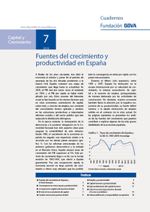The intense accumulation of capital and job creation seen in the last expansive cycle have been accompanied by a negative trajectory in terms of productivity
The BBVA Foundation and the Ivie have disseminated the note Sources of growth and productivity in Spain, detailing which part of economic growth corresponds to the accumulation of productive factors (capital, labor and human capital), and which part to productivity improvements. Also shown in this issue are some of the main weaknesses of the Spanish economy.
Note no.7-2010: Sources of economic growth and productivity in Spain
 Since 1980 growth in Spain has been 3% per annum: more than half of this has been driven by capital accumulation, while 0.8 points and 0.5 points have been contributed by labor and human capital, respectively. Faced with such intense accumulation of productive factors (capital, labor and human capital), productivity has remained stagnant throughout the period, making a negative contribution to growth in most of the last growth cycle.
Since 1980 growth in Spain has been 3% per annum: more than half of this has been driven by capital accumulation, while 0.8 points and 0.5 points have been contributed by labor and human capital, respectively. Faced with such intense accumulation of productive factors (capital, labor and human capital), productivity has remained stagnant throughout the period, making a negative contribution to growth in most of the last growth cycle.
This recent negative trajectory of productivity contrasts with the good performance seen in other areas such as improving the quality of labor (human capital), described in the note. However, the effects of improved human capital on productivity are minimized by the fact that they have not been made the most of, as can be seen by the high rates of overqualification and temporality in Spain.
Among other aspects, the note also illustrates that the unproductive overinvestment which occurred during the housing boom would explain why the efficiency in the use of production factors has tended not to progress in Spain as it has in other countries.
Antón Costas, professor at the University of Barcelona, points out in his closing analysis of this note that the crisis can lead to incentives to search for lost productivity. According to Costas, the credit crunch and increased competition for markets will stimulate business conduct aimed at exploiting this sleeping productivity. It is hoped that what happened with Barcelona and Real Madrid will also take place with companies. That is, both have managed to improve their performance without substantially changing the allocation of production factors, thanks to more efficient management, Costas concludes.
This note is based on two chapters from the study Sources of growth and productivity in Europe and Latin America.
Other related notes:
5-2010 Sources of world economic growth since 1995
6-2010 Sources of economic growth in Latin America
8-2010 Sources of economic growth in Asia
9-2010 Capital endowments. International perspective
For further information on the notes in the Capital and Growth series.
The BBVA Foundation and the Ivie have disseminated the note Sources of growth and productivity in Spain, detailing which part of economic growth corresponds to the accumulation of productive factors (capital, labor and human capital), and which part to productivity improvements. Also shown in this issue are some of the main weaknesses of the Spanish economy.
Note no.7-2010: Sources of economic growth and productivity in Spain
 Since 1980 growth in Spain has been 3% per annum: more than half of this has been driven by capital accumulation, while 0.8 points and 0.5 points have been contributed by labor and human capital, respectively. Faced with such intense accumulation of productive factors (capital, labor and human capital), productivity has remained stagnant throughout the period, making a negative contribution to growth in most of the last growth cycle.
Since 1980 growth in Spain has been 3% per annum: more than half of this has been driven by capital accumulation, while 0.8 points and 0.5 points have been contributed by labor and human capital, respectively. Faced with such intense accumulation of productive factors (capital, labor and human capital), productivity has remained stagnant throughout the period, making a negative contribution to growth in most of the last growth cycle.This recent negative trajectory of productivity contrasts with the good performance seen in other areas such as improving the quality of labor (human capital), described in the note. However, the effects of improved human capital on productivity are minimized by the fact that they have not been made the most of, as can be seen by the high rates of overqualification and temporality in Spain.
Among other aspects, the note also illustrates that the unproductive overinvestment which occurred during the housing boom would explain why the efficiency in the use of production factors has tended not to progress in Spain as it has in other countries.
Antón Costas, professor at the University of Barcelona, points out in his closing analysis of this note that the crisis can lead to incentives to search for lost productivity. According to Costas, the credit crunch and increased competition for markets will stimulate business conduct aimed at exploiting this sleeping productivity. It is hoped that what happened with Barcelona and Real Madrid will also take place with companies. That is, both have managed to improve their performance without substantially changing the allocation of production factors, thanks to more efficient management, Costas concludes.
This note is based on two chapters from the study Sources of growth and productivity in Europe and Latin America.
Other related notes:
5-2010 Sources of world economic growth since 1995
6-2010 Sources of economic growth in Latin America
8-2010 Sources of economic growth in Asia
9-2010 Capital endowments. International perspective
For further information on the notes in the Capital and Growth series.






